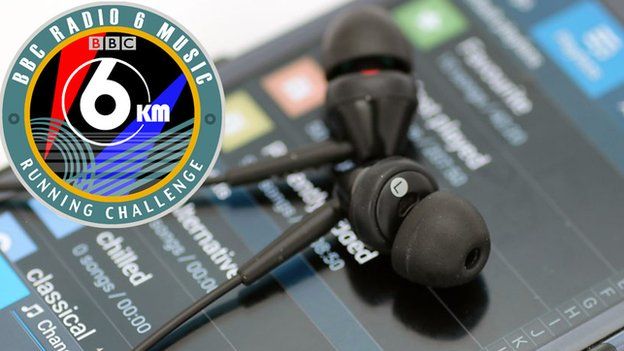How BBC 6 Music Running Challenge can make you run faster this summer
- Published

BBC 6 Music is putting together a playlist to help listeners get out and run
This summer, the world's fastest athletes are taking to the stage in Rio for the Olympics.
To mark this great sporting occasion, BBC 6 Music is celebrating the motivational power of music.
From 5-19 August, BBC 6 Music will be playing tunes that help propel members of the Great Britain squad to victory; from young athletes like Katarina Johnson-Thompson and Adam Gemili to the double Olympic rowing champion James Cracknell.
There will be additional contributions from sporty stars of the BBC, including 6 Music's own dance beat devotee Nemone, who used to run the 400m competitively.
And 6 Music is putting together a playlist of tunes to help listeners get out there and run - from seasoned sprinters seeking personal bests to armchair athletes who've not run in a while.
They've got the tunes, if you're willing to clock up the kilometres in a collective running challenge.
The first 16 tracks on the playlist are the motivational and running favourites of Dr Costas Karageorghis, a sports psychologist at Brunel University and the author of Applying Music in Exercise and Sport.
Steve Lamacq launched this playlist on his show on Friday, 5 August.
It is designed to motivate you from mental preparation, through low, medium and high intensity activity, to cool down and recuperation - and Dr Karageorghis' recommendations will be boosted by tracks that 6 Music listeners say really work for them.
Dr Karageorghis has been examining the effects of music on exercise and sport for over 20 years and his research has led him to describe music as a 'legal drug', which can stimulate or sedate an anxious, pre-competition athlete.
He explains that one of the main ways in which music can enhance performance is through 'auditory-motor synchronisation', the synching of movements to the beat.
If you analyse an athlete's stride rate and find music which is one or two beats per minute faster, it can increase their endurance, or their speed, but the increased effort is imperceptible. In other words, music makes you work harder but it reduces your perception of effort.
His research shows that music can also help by influencing arousal levels, or how 'psyched up' a runner feels. A loud, upbeat piece of music can help generate a winning mind-set, while a slow, sedative piece can have the opposite effect. It also also blocks fatigue-related signals that go from your muscles and vital organs to the brain.
Therefore, according Dr Karageorghis' research, if you pick music with your activity and preferences in mind, the reduction in perceived effort can be as big as 12%.
Make Your Move: Why people love to run
So which tracks should you be running to?
Musical preferences are very subjective, and Dr Krageorghis hasn't identified one, champion-making genre. But he says that a powerful track will have a strong bass line, a steady and driving rhythm, affirming lyrics and uplifting harmonies.
And you needn't worry about matching your feet to the beats because music used 'asynchronously' will also be effective. Indeed, researchers have identified a rhythmic sweet spot: a tempo range of between 120 and 140 beats per minute.
One of the consequences of the work conducted by Dr Karageorghis and his peers is that governing bodies like USA Track & Field have banned the use of music in competition!
But the use of music, where safe to do so, is actively encouraged in 6 Music's Running Challenge. Select your soundtrack, lace up those trainers - and let us know which tunes work for you.
Want to take part in the 6 Music Running Challenge? Tell us your favourite tracks and share your progress on social media with the hashtag #Run6Music
- Published3 April 2019
- Published27 April 2016
- Published10 October 2014
- Published21 July 2016
- Published13 August 2018
- Published10 April 2014
- Published2 June 2014